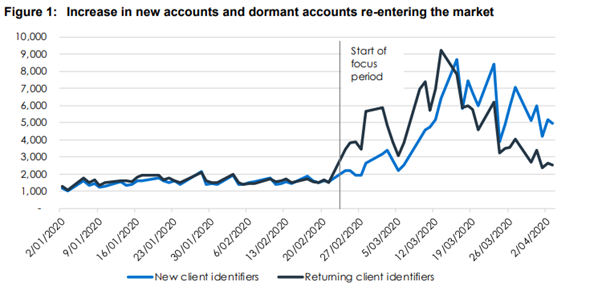When COVID-10 implications hit Australian shores in March, it forced investors to sell indiscriminately, inducing extreme volatility and dislocations across asset classes. The market regulator, Australian Securities & Investment Commission (ASIC) was required to press the brakes on daily trades.
Volumes grew so exponentially that exchanges and trading participants worked on weekend for the week ended 15 March. This was due to significant trading activity, particularly on 13 March.
The regulator intervened to maintain market resilience. As COVID-19 induced sell-offs intensified in late February, the trading volumes started to jump increasingly.
Related: Australian Retail Investors And The Market Turmoil
The Council of Financial Regulatory were monitoring markets for any discrepancies and that markets continue to function in an orderly as well as fair manner, thereby maintaining higher standards.
ASIC was of a view that a sudden jump in trading volumes to abnormal levels exhibits risks for the market participants and infrastructure providers, especially in processing and risk management.
Under Market Integrity Rules, the regulator imposed a limit on large market participants for trade executions – effectively reducing the trade executions range by up to 25% from the volumes recorded on 13 March.
On 14 May, the regulator has issued guidance to the large brokerages, which revoked the trade execution limits. ASIC has taken this step as:
- trading volumes have stabilised;
- steps were taken by participants to lower volume which has resulted in lower failures and robust settlements;
- process enhancements on clearing and settlements facilities by market participants.
In March, the record trading activity occurred at a time when businesses were operating remotely. ASX, Chi-X and other participants have upscaled ability to accommodate large trading volumes.
ASIC expects that market participants should be able to match all the trades with orders. They must ensure trade matching is undertaken by internal processing and risk management systems, including settlement and clearing. And, the market participant should promote fair and orderly operations of equity markets.
At the same time, the regulator remains vigilant and necessary action would be undertaken as required by the conditions in an effort to maintain resilient market functioning in the country.
Retail investors were very busy and lost a lot of money
A recent paper published by the regulator highlighted a significant increase in volumes from retail investors. Between late February and early April (focus period), retail brokers experienced heavy volumes, such that their average daily market turnover more than doubled to $3.3 billion from $1.6 billion in benchmark period (22 August 2019 to 21 February 2020).
In the focus period, it was noted that retail brokerage were net buyers. Also, new clients accounts grew strongly at an average of 4,65 new accounts every day. ASIC observed that around 140k accounts were recorded for the first time in its database.

Source: ASIC
A lot of client accounts became active that had not been active in the past six months. The paper noted that retail clients were trading very frequently. Day trading increased as retail clients held a particular stock for just one day on average.
During the focus period, retail investors experienced poor market timing. Around 66% of days when retail were net buyers, the share prices declined the next day. In 50% of the days when they were sellers, the share prices rose the next day.
In the week ended 22 March, retail investors suffered gross losses of $428 million in CFDs, based on the data of twelve CFD providers, which account for 84% of the market share. However, net losses of retail were $282 million during the week.
ASIC banned betting over the benchmark index
In mid-April, the regulator reported that Sportsbet launched a betting product over the S&P/ASX 200, which was subsequently withdrawn by the provider as ASIC intervened. Sportsbet was not carrying an applicable license to offer financial products in its offering.
As majority of staff was working remotely, ASIC also recognised challenges in implementing necessary procedures by the betting agency. It expects financial service providers to comply with regulatory requirements amid COVID-19. ASIC continues to monitor markets functioning and will act appropriately wherever discrepancies are identified.
ASIC to establish a national expert group for young Australians
Australian educational curriculum provides financial education at school. It has helped the country to achieve 5th rank out of 20 in a survey conducted by OECD on the basic financial literacy of 15-year olds.
The regulator will incorporate a national expert group, which would uncover the areas that impact financial wellbeing of young Australians. It was understood that young generation is tech savvy consumer, and they need better understanding when making financial decisions, including higher education and employment.
The group will constitute of members from public and private organisations as well youths. It will enable young Australians to manage money, plan for future financial decisions and control their financial lives.



